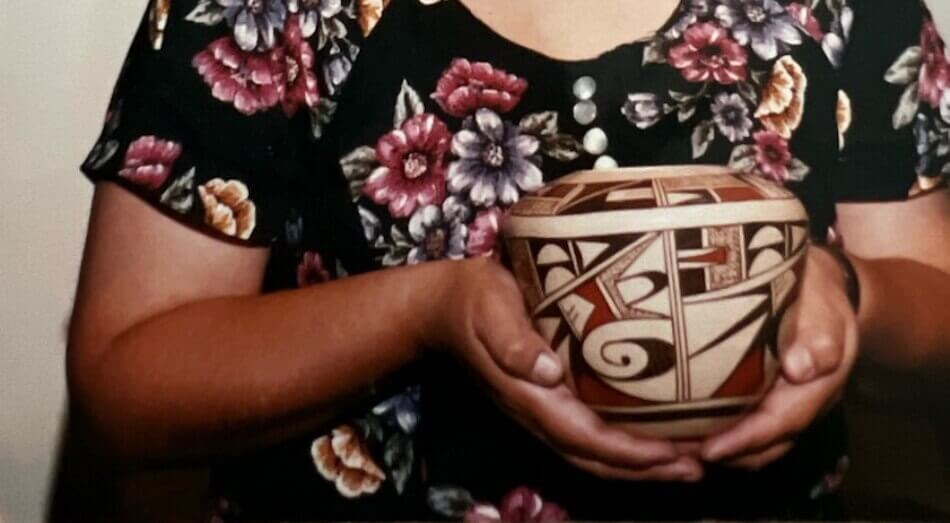Colin Bradley Files Lawsuit Against the Federal Government on Behalf of Hopi Artist's Family
By Joyce Hanson, Law360
The children of a renowned Hopi artist have sued the United States in Arizona federal court on claims that an Indian Health Service facility gave their deceased mother's body to the wrong family, saying they couldn't give her a proper burial due to the government's negligence.
Starlie and Julian Mahkewa, the surviving children of artist Dawn Navasie, in their Friday complaint accuse the U.S. Department of Health and Human Services, its Indian Health Service and the Hopi Health Care Center IHS facility in Polacca, Arizona, of recklessly mishandling their mother's remains by allowing her body to be collected and buried by a different family.
Navasie's children knew that, according to Hopi tradition, they had only four days to bury their mother, according to the lawsuit.
So, in accordance with tribal ritual, they quickly gathered a burial box along with clothes, shoes, jewelry and food to prepare for Navasie's interment. Mahkewa family members also dug a hole in the ground where they were planning to lay their mother's body to rest, the suit says.
But when three family members arrived to collect her remains on Nov. 25, 2022, a Hopi Health Care Center worker named Povi Lomayaoma admitted to giving Navasie's body to the other family and profusely apologized to Mahkewa family members for the loss and pain they suffered while adding that the IHS facility did not train employees on burial policies.
"Upon information and belief, it was Povi Lomayaoma who negligently gave Ms. Dawn Navasie's body to the other family," the suit states, adding in a footnote, "Povi Lomayaoma informed plaintiffs that Hopi Health Care Center employees are not trained on proper internment policies and procedures. Moreover, it is custom for the employees to avoid looking at the bodies of the deceased, as it is against their tribal culture and beliefs."
The suit claims that three Mahkewa family members spent four hours looking for their dead relation. The IHS facility's morgue contained three freezers, and none of them held Navasie's body, the suit asserts. A security guard showed a body to Starlie Mahkewa's wife, Tiffany Johnson, but it was not Navasie's.
"The security guard informed Ms. Johnson that the Hopi Health Care Center did not have any confirmation policies for the distribution and collection of remains," the suit says. "In fact, Ms. Johnson was also informed that the Hopi Health Care Center did not even have identification procedures in place, like crematory tags."
When the Mahkewas later reached out to Hopi religious leaders to discuss the possibility of exhuming their mother's body, so they could bury her with her own family, they were told exhumation is against Hopi cultural beliefs, the suit asserts.
Instead, the religious leaders instructed the family to burn everything they had prepared for Navasie's burial, including the box, clothes, shoes, jewelry and food. The Mahkewas also had to fill and cover the hole they had dug for their mother's burial, according to the complaint.
"Having lost the ability to say goodbye to their mother in such an egregious way, plaintiffs have suffered immeasurable damages, including severe emotional distress and mental anguish," the Mahkewas say.
The Native American art website PuebloDirect.com says Navasie "was born into the Hopi-Tewa Reservation in 1961" and continued a family tradition of pottery making.
"Dawn specializes in handmade traditional Hopi style pottery," according to the site. "She prefers making the larger ollas (larger pots) because they have more room to paint her favorite designs of mythical rainbirds and rain clouds. She also paints moths, weather symbols and elements of the earth. Natural minerals and vegetables like wild bee plant, hematite and red clay are used for coloration."
The Mahkewas in June 2023 sought $1 million each in an administrative complaint with the Department of Health and Human Services under the Federal Tort Claims Act, but the department denied their claims on April 15.
The federal complaint filed Friday followed. It alleges counts of negligence under the Federal Tort Claims Act and Arizona common law. The Mahkewas seek general and compensatory damages, including pain and suffering, loss of enjoyment of life, and economic loss.
Representatives for the Mahkewas and the U.S. government were not immediately available for comment Wednesday.
Starlie Mahkewa and Julian Mahkewa are represented by Colin Bradley of Zwillinger Wulkan PLC and Dominic Gomez of Taylor & Gomez LLP.
Counsel information for the federal government was unavailable.
The case is Starlie Mahkewa et al. v. U.S. et al., case number 3:24-cv-08155, in the U.S. District Court for the District of Arizona.
Editing by Kristen BeckerAll Content © 2003-2024, Portfolio Media, Inc.

